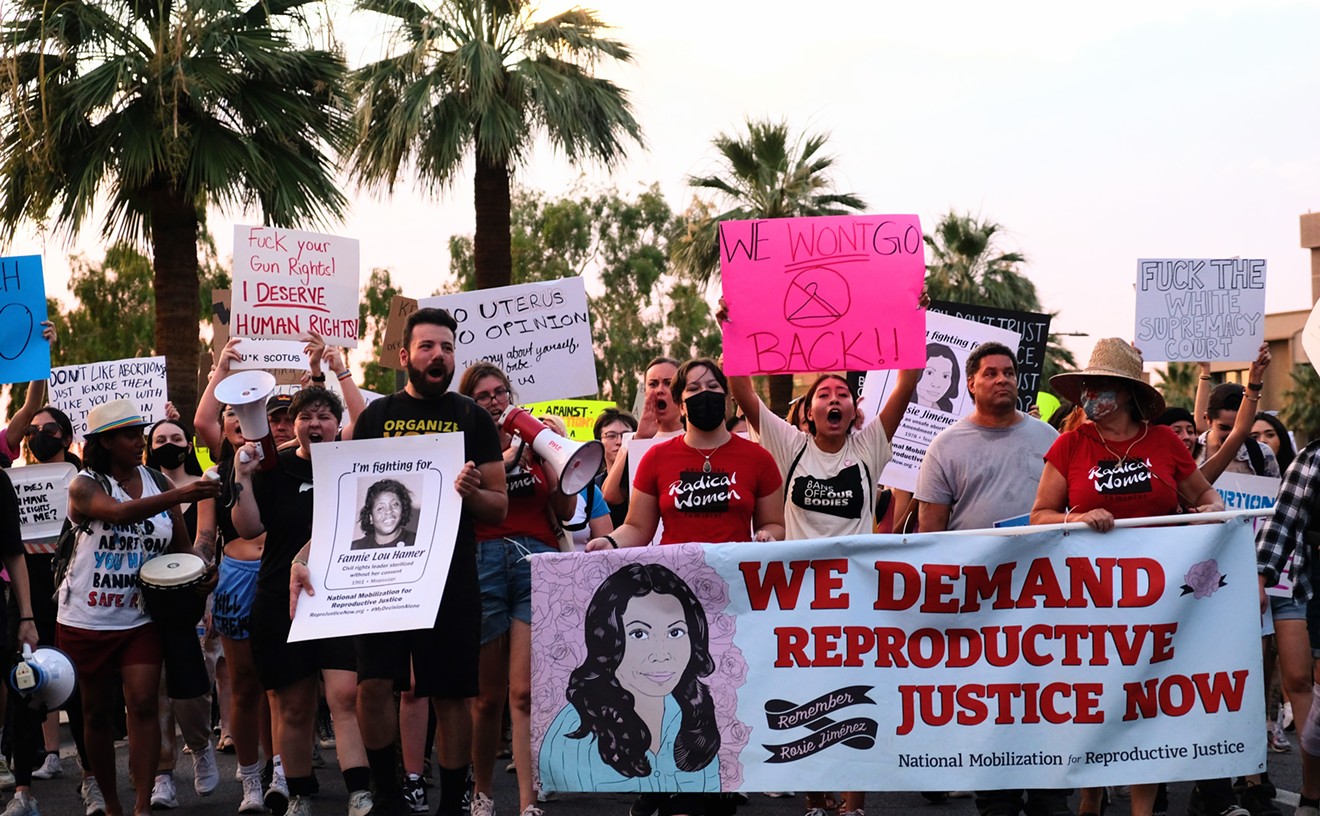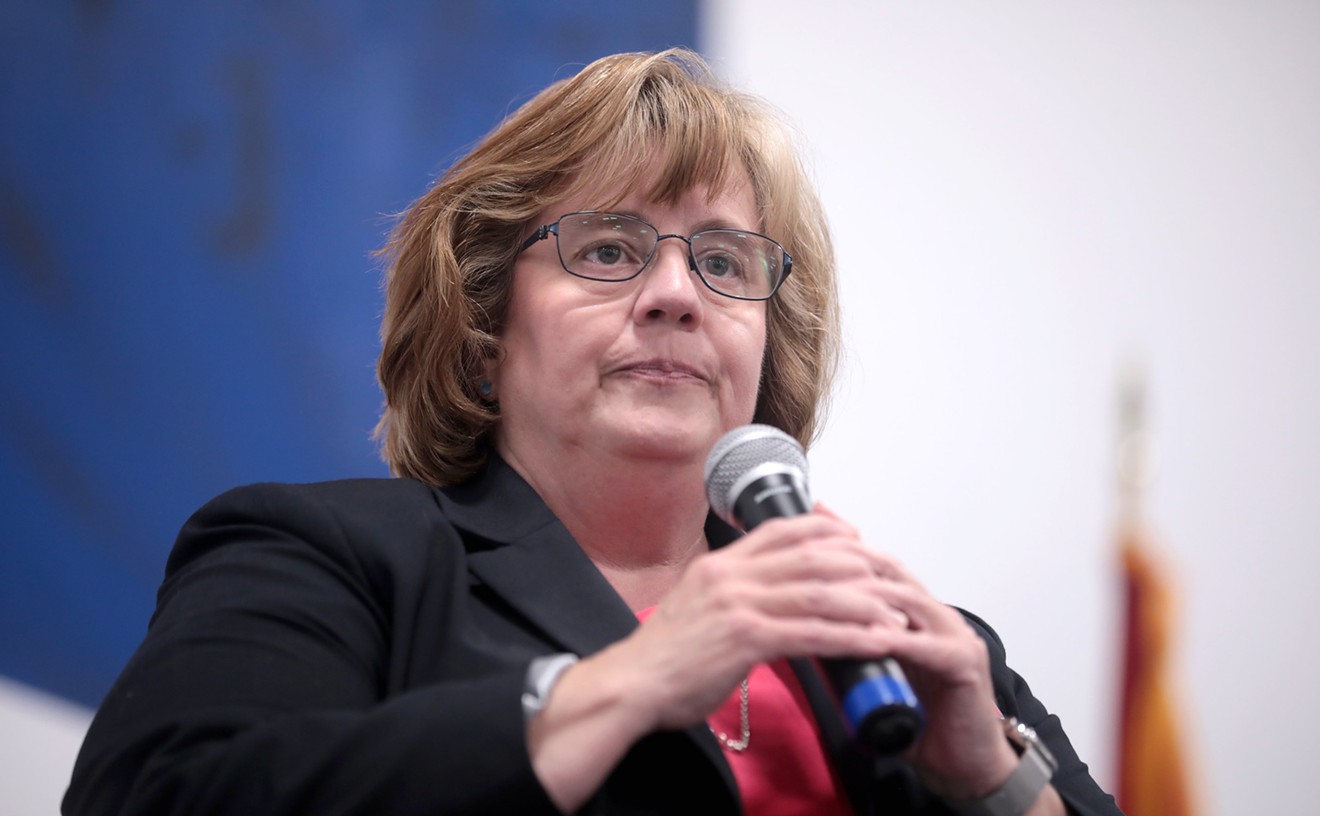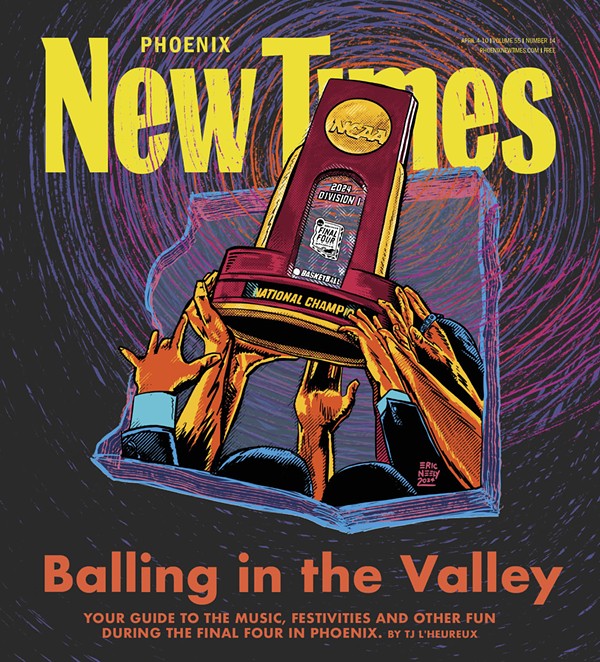Governor Doug Ducey's work to defeat marijuana legalization in Arizona has included a lot of behind-the-scenes fundraising, including a pricey propaganda talk set for Tuesday at a posh hotel.
Ducey's the headlining special guest for the "roundtable discussion" and reception that begins at 4:30 p.m. on Tuesday at the Sanctuary on Camelback, 5700 East McDonald Drive, in Paradise Valley. He'll be joined by two heavyweight Colorado prohibitionists: John Suthers, mayor of Colorado Springs and former Colorado attorney general; and Sergeant Jim Gerhardt, member of the openly prohibitionist Rocky Mountain High Intensity Drug Trafficking Area task force.
Arizonans for Responsible Drug Policy, the anti-Prop 205 group run by Yavapai County Attorney Sheila Polk and talk-radio host Seth Leibsohn, is hosting the event. The group wants guests to pay $10,000 per person for the hourlong "discussion," plus another $1,000 per person for the reception, which is scheduled to last until 7 p.m.
It's the latest example of the fundraising muscle Ducey's been bringing to ARDP, which has raised about $1.5 million in its effort to maintain felony prohibition for non-medical use of cannabis in Arizona.
A number of ARDP's benefactors also contributed to Ducey's 2014 gubernatorial campaign.
Some examples:
• South Dakota businessman T. Denny Sanford gave ARDP $100,000 in August — the largest contribution the group has received from an individual. Sanford gave $1,000 to Ducey in 2014.
• Don Luke, owner of Bill Luke Chrysler, donated $5,000 to ARDP. He donated $6,000 to Ducey's 2014 campaign, forcing Ducey to return $4,000 of the money to stay under the $2,000 individual donation limit.
• Pima Medical Institute gave $40,000 to ARDP. Richard Luebke, the school's owner, and his wife each gave $2,000 to Ducey in 2014.
• Crest Insurance Group gave $5,000 to ARDP. Cody Ritchie, president of Crest, gave $2,000 to Ducey in 2014.
• HSL Properties of Tucson gave $5,000 to ARDP. The company's president, Omar Mireles, gave $2,000 to Ducey in 2014.
• Ewing Irrigation Products of Phoenix gave $10,000 to ARDP. Doug York, Ewing's president, gave $2,000 to Ducey in 2014.
• Movie theater owner Michael Pollack gave $10,000 to ARDP. He and his wife each gave $2,000 to Ducey in 2014.
Ducey declined to comment for this story. Without his input, it's impossible to know which donations he influenced directly, which were handled by a representative, and which might be coincidental.
But Steve Sanghi, CEO of Microchip Technology Incorporated, told reporters in July that he had the company donate $25,000 to ARDP in May at Ducey's personal request.
On the other hand, Adam Goodman, owner of Goodmans Interior Structures, tells New Times he never talked to Ducey before making a $2,620 donation of goods and services to ARDP, even though he also contributed $912 to Ducey's campaign in 2014.
"I cannot put our employees at risk if an impaired individual is operating machines or equipment," Goodman says, explaining why he supports continued prohibition. "If you have a plan to decriminalize recreational use while also protecting workplace safety, give me a call when your campaign needs furniture."
Omar Mireles of HSL Properties says he believes his partner made the donation to ARDP; New Times left a voice mail for the partner.
Ducey's campaign manager, J.P. Twist, notes that the governor has been very open about his desire to see Prop 205 fail.
"The governor is helping out where and when he can — including fundraising," Twist says.
Twist wouldn't elaborate on how the governor may be leaning on his supporters to help out Polk and fellow anti-marijuana crusader Maricopa County Attorney Bill Montgomery, both of whom are Ducey allies.
"The governor is making these calls, and then he's sending in Seth, Sheila, and Bill to make these presentations," says J.P. Holyoak, chair of the pro-Prop 205 campaign. "It's not illegal, but he's using the weight of the governor's office in an attempt to campaign against a citizens' initiative."
Holyoak adds that "of course" the donors expect something in return from Ducey for their money.
A recent poll shows that the initiative may pass narrowly in November's election. Previous surveys have shown that roughly half of Arizonans are in favor of making marijuana legal for adult use.
Prop 205 would give Arizonans 21 and older the freedom to possess, use, and grow personal amounts of cannabis, and would establish a system of retail stores that would sell marijuana products. About 600,000 adults 21 and older regularly use marijuana in Arizona, according to a state estimate. Except for the 100,000 medical-marijuana cardholders in the state, all marijuana users in Arizona face felony arrest for possession of any amount of pot.
The campaign led by Holyoak has raised more than $3 million from the national Marijuana Policy Project and local dispensaries that would benefit from the measure.
While Ducey has kept his fundraising efforts for ARDP on the quiet side, he has been outspoken for months about his opposition to Prop 205. Some of his statements have raised eyebrows.
"I don’t think that any state became stronger by being stoned," Ducey told a reporter earlier this month — a line that doesn't make much sense, Arizona Republic columnist E.J. Montini pointed out.
Ducey also told the public recently that people should check their facts if they want to claim that marijuana isn't addictive or is safer than alcohol. The Washington Post took up Ducey's challenge and fact-checked him. The paper used stats to prove that alcohol is unquestionably more toxic, because unlike marijuana it fatally poisons people, and that although marijuana is addictive, it's less addictive than alcohol and other substances.
At least one of Ducey's appointees, Tim Jeffries, director of the state Department of Economic Security, has helped lead the charge against Prop 205 for the governor. Jeffries, who gave $1,000 to Ducey's campaign in 2014 and $500 to ARDP in December, said on Leibsohn's radio show on Thursday that if Prop 205 passes, Arizona will have "little kids dying from eating pot-laced gummy bears, which is happening regularly in Colorado."
In fact, there are no reported deaths from eating marijuana edibles. While pediatric hospital admissions related to marijuana have risen in Colorado since voters approved the state's legalization law in 2014, all of the exposed children apparently made a complete recovery, Dr. George Sam Wang, an assistant professor at the University of Colorado in Denver who has studied the issue, tells New Times.
ARDP's other guests at the Sanctuary event, Gerhardt and Suthers, may be preparing to offer "facts" about marijuana that are similar to Jeffries'.
Gerhardt's one-sided activism is well known to cannabis-policy observers and has been the subject of critical articles such as, "Meet the Cop Getting Paid to Lie to Politicians About Pot," by the Southern Cannabis advocacy group. He was the spokesman for last year's Rocky Mountain HIDTA report on Colorado legalization, which was criticized as biased.
Suthers, the mayor of a Colorado city that enforces a ban on recreational marijuana dispensaries, has for years been one the state's most strident voices on pot's "dangers."
Some of ARDP's donations have been controversial even without Ducey's involvement.
ARDP has taken money from the alcohol industry and the parent company of Arizona's largest utility, Arizona Public Service. Last week, Holyoak's campaign bashed the opposition for taking its largest donation of $500,000 from Insys Therapeutics, which wants legal marijuana to fail so its synthetic THC product sells better, and which is under investigation for aggressively marketing the dangerous opiate fentanyl.
Read the invitation to the Ducey fundraiser from Arizonans for Responsible Drug Policy:
[
{
"name": "Air - MediumRectangle - Inline Content - Mobile Display Size",
"component": "18478561",
"insertPoint": "2",
"requiredCountToDisplay": "2"
},{
"name": "Editor Picks",
"component": "16759093",
"insertPoint": "4",
"requiredCountToDisplay": "1"
},{
"name": "Inline Links",
"component": "17980324",
"insertPoint": "8th",
"startingPoint": 8,
"requiredCountToDisplay": "7",
"maxInsertions": 25
},{
"name": "Air - MediumRectangle - Combo - Inline Content",
"component": "16759092",
"insertPoint": "8th",
"startingPoint": 8,
"requiredCountToDisplay": "7",
"maxInsertions": 25
},{
"name": "Inline Links",
"component": "17980324",
"insertPoint": "8th",
"startingPoint": 12,
"requiredCountToDisplay": "11",
"maxInsertions": 24
},{
"name": "Air - Leaderboard Tower - Combo - Inline Content",
"component": "16759094",
"insertPoint": "8th",
"startingPoint": 12,
"requiredCountToDisplay": "11",
"maxInsertions": 24
}
]











